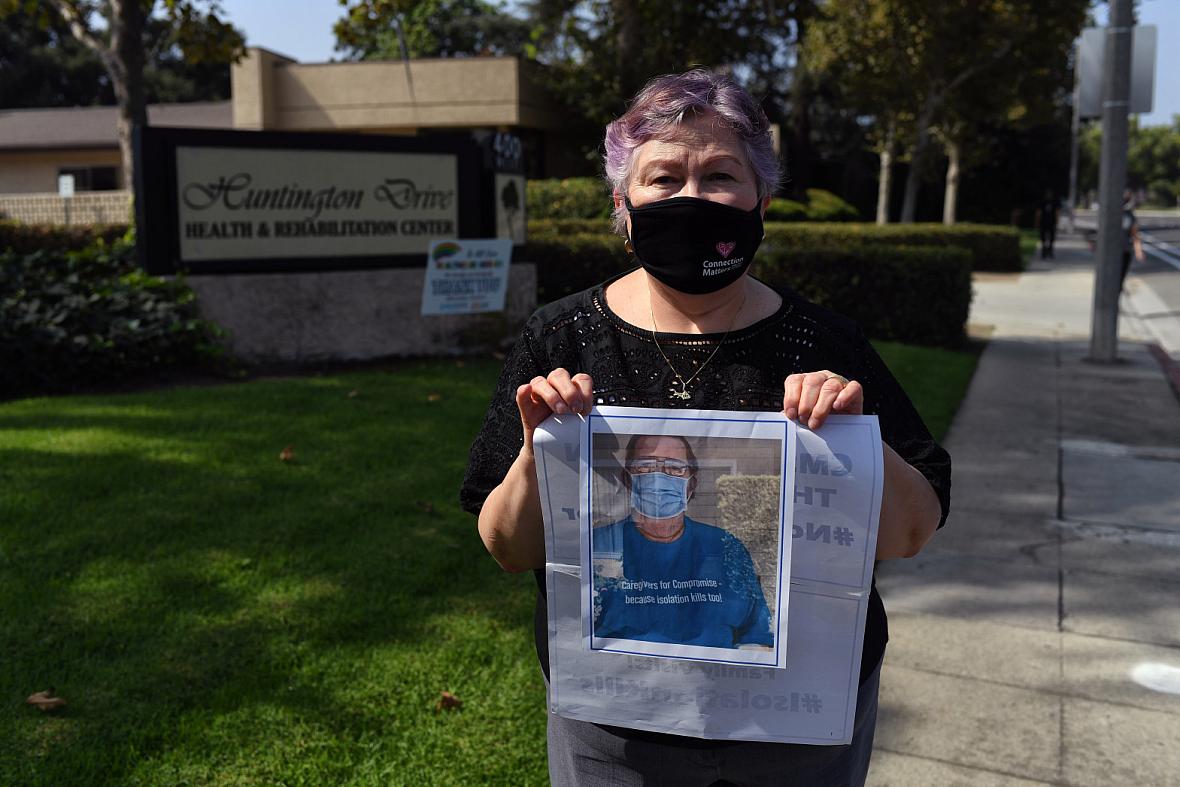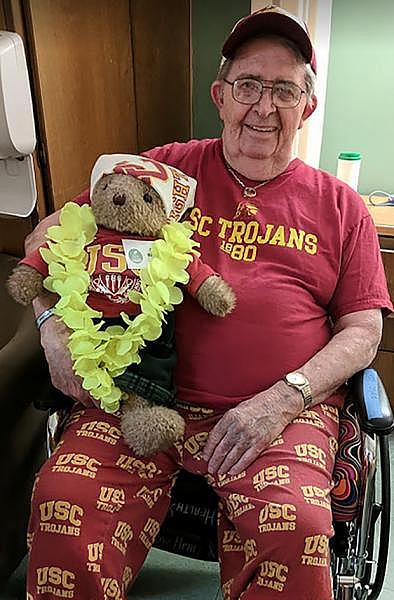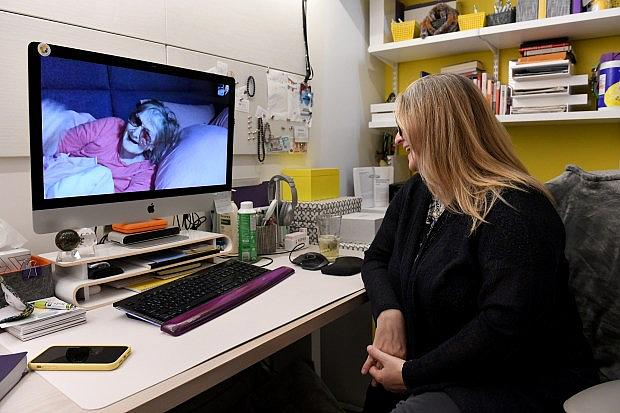Social isolation takes toll on Southern California nursing home residents during pandemic holidays
This story was produced as part of a larger project by Brenda Gazzar, a participant in the 2020 California Fellowship.
Her other stories include:
'This isn't a drill': How LA's Motion Picture home battled coronavirus
‘Pandemic within a pandemic:’ What’s fueling LA County’s coronavirus death toll in nursing homes?
Known and loved: These six residents of LA’s Motion Picture home died of coronavirus
‘Behind the 8-ball:’ Many Southern California nursing homes hit hard by coronavirus had prior issues
A tale of two Southern California nursing homes in the era of coronavirus
Family of nursing home resident who died: ‘She had 3 really good years there and 1 really bad week’
Can California nursing homes avoid the next ‘humanitarian crisis?’
This nursing home ‘angel’ struggled to support her family. Then she got coronavirus…

Melody Taylor Stark poses for a photo after visiting her husband, Dr. William Stark, who was a resident of Huntington Drive Health and Rehabilitation Center in Arcadia, Thursday, October 8, 2020. Stark, who lives in Monrovia, says she was only allowed to visit her husband once a month for 15 minutes since August amid the coronavirus pandemic and had been urging the nursing home to allow her more frequent visits before he died on Nov. 22.
(Photo by Hans Gutknecht, Los Angeles Daily News/SCNG)
Melody Taylor Stark would usually visit her husband twice a day at his Arcadia nursing home, sharing coffee and horoscopes on weekday mornings and having dinner together in the evening.
But when the coronavirus pandemic struck, those visits came to an abrupt halt — for five months.
Dr. William Stark, a retired dentist who had several medical issues, died on Nov. 22 after he and his wife endured months of pandemic visitation restrictions at his Arcadia nursing home. (Courtesy Photo)
“I saw a quick decline emotionally, a lot of depression in someone who is normally an optimistic person,” said Stark, an electronic health records specialist. “At least a couple times or more a week, (he would say), ‘Oh, Melody, this is no way to live.’ ”
Starting in August, Huntington Drive Health and Rehabilitation Center allowed her to see her husband, Dr. William Stark, for precisely 15 minutes once a month, she said. Her first indoor visit at the facility took place on Nov. 17.
Later that day, her husband — who used a wheelchair and had several medical conditions, including post-polio syndrome and cancer — was whisked away to the hospital due to a decline in kidney function.
The retired dentist, who was 84, died five days later, just days before Thanksgiving. His causes of death were listed as a particular bacteria, pneumonia and COVID-19, for which he tested positive at the hospital, his wife said.
“The hardest part was knowing how much good quality of life was stolen from him in the last several months,” Melody Taylor Stark said the day after her husband’s death. “Before lockdown, we did a lot of things to enhance as much quality of life as possible. During isolation — because nursing homes are so poor at psychosocial and emotional wellness support — people were just left in their rooms.”
While the nursing home did some things to ramp up activities, Stark argued that it was nothing like the person-centered care that her husband needed.
The administrator of Huntington Drive Health and Rehabilitation Center, which has two stars in a five-star rating system for overall quality on Medicare’s Care Compare, declined to comment for this article. The facility’s owner also could not be reached on Friday.
Federal guidance allows local health departments to ease their original COVID-19 restrictions placed on nursing home visitors in a phased approach based on the local situation and a particular facility’s case, staffing and testing status.
But because of the high COVID positivity rate in Los Angeles, “we are under the strictest requirements” for nursing home visitation, said Molly Davies, who oversees the long-term care ombudsman program in Los Angeles County that investigates complaints from such residents.
Visitors as caregivers
Arguments have been made that visitors who act more as caregivers, who for example help encourage people with dementia to eat, should have more access than general visitors. Facilities are working with local public health officials to make some of these determinations, she said.
“There’s this balance that’s trying to be struck between protecting people’s health, safety and health care and giving them life,” she said.
There are also federal requirements that these visits must be supervised by staff, which can complicate matters for the facility, she said. “In the past they haven’t had to do that and we already know some places are having staffing shortages anyway,” Davies said.
Long-term care facilities aren’t hiring a staff member to coordinate and supervise visits six or seven days a week but they should, she said, adding that human contact “is incredibly healing.”
‘Social isolation kills’
Dr. Michael Wasserman, immediate past president of the California Association of Long Term Care Medicine, said limited visitations are harming residents of nursing and other elder care homes.
“It’s a challenge because social isolation kills,” said Wasserman, a geriatrician. “That’s the bottom line.”
In a recent survey conducted by Altarum, a nonprofit and research consulting group, more than three-quarters of nursing home residents who responded said they felt lonelier than usual during the pandemic, while nearly two-thirds said they did not leave their rooms to socialize.
“The broader evidence in the literature, as well as our survey findings detailed in this report, suggest that social isolation has produced a devastating emotional impact on many residents — and that this has also translated into accelerated physical and mental health decline,” the report stated.
Testing and personal protective equipment must be provided to visitors and they must adhere to proper infection control measures, Wasserman said.
“We’re going to have to determine what the cost is and who is going to pay for it,” he said, adding that nursing homes “operate on a fairly narrow margin.”
Maitely Weismann, co-founder of the Essential Caregivers Coalition, is calling for the federal establishment of an essential caregiver role in congregate and long-term-care settings to safely accommodate residents during visitation bans.
The essential caregiver would be chosen by each resident and trained in emergency procedures to support residents “up close and in person,” and should have access regardless of the positivity rate in the community, she said.
‘They are not prisoners’
“The rights of residents in the name of public health are being completely swept aside,” Weismann said. “They are not prisoners.”
In assisted-living facilities, which mainly provide personal care for those in a home-like and social setting, many family members support their loved ones by helping them eat, clean their rooms, change clothes and bathe during their visits.
“We show up and do informal advocacy and oversight,” Weismann said.
Maitely Weismann, co-founder of the Essential Caregivers Coalition, speaks to her mother, Celia Weismann, who lives in an assisted-living facility in the Playa Vista community of Los Angeles, via video technology from her home in Brentwood on Tuesday, September 29, 2020. (Photo by Axel Koester, Contributing Photographer)
Weismann’s mother is at an assisted-living facility in Los Angeles called Sunrise of Playa Vista, which now allows one-hour socially distanced outdoor and indoor visits in designated areas as often as families would like, as long as the facility can accommodate them. Initially, family members were limited to 30-minute outdoor visits once a week.
“With COVID-19 cases surging across the U.S., we remain vigilant in our efforts to protect seniors from this virus,” the facility said in a written statement. “We also recognize the need for family connections during the holidays and our team is working hard to create safe opportunities for families to celebrate.”
Sunrise of Playa Vista organized “socially distanced Thanksgiving meals” in its dining room, suite stops, hydration stops and one-on-one holiday themed programming while closely following guidance from federal, state and local public health officials, the facility said.
“I think it’s amazing that they’re trying,” Weismann said of the facility’s recent efforts.
The nursing home operator recently sent an email to its communities mentioning the possibility of in-room visits by a resident-designated essential caregiver, up to two per resident, if the county’s positivity rate drops below 5%.
However, Sunrise of Playa Vista is not currently offering in-room visitation based on guidance from the Los Angeles County Department of Public Health and the California Department of Social Services, the facility said. The latter regulates assisted-living homes in the state.
Weismann argued that essential caregivers could be trained to follow infection control protocols and, thus, should be exempt from any positivity rate mandates.
'Choice or dignity’
Long-term care residents “should have the power of choice or dignity,” she said. “Right now, they’re being denied that in an overwhelming capacity.”
Meanwhile, several weeks before his death, Dr. Stark told this news group that he understands that the coronavirus “is nothing to fool around with” and was forcing major changes at his Arcadia skilled nursing home. But that didn’t make briefly seeing his wife there once a month, or the social isolation, any easier.
“I’m in essence in a cell, a room,” he said in October. “I’ve got TV and the newspapers but that’s it. … I am not happy. I don’t think anybody is truly happy.”
The story is part of a series produced by correspondent Brenda Gazzar, participating in the USC Annenberg Center for Health Journalism‘s California Fellowship.
[This story was originally published by The Press-Enterprise.]

